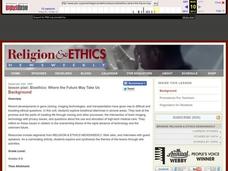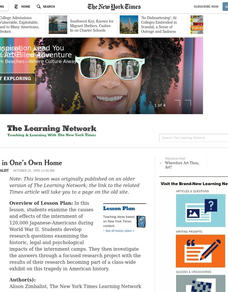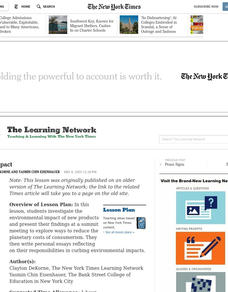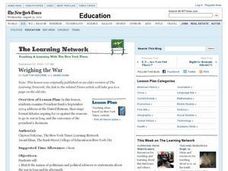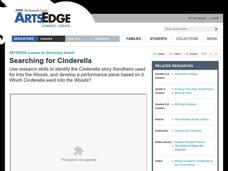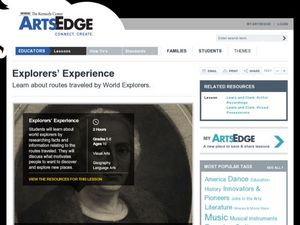Curated OER
Taking Stock of Iraq
Students research key people, places, organizations, and nations involved in Iraq's "transition." Then they present their research in a lesson format to fellow classmates at a teach-in.
Curated OER
Taking the Witness Stand
Students identify a pivotal event in world history that they would have liked to have witnessed. They then research this event and write a first-person account of it as if they had been present. Their first-prerson account is modeled...
Curated OER
Bioethics: Where the Future May Take Us
Students analyze ethical issues related to technology, medicine, and reproduction. In this ethics lesson, students research selected bioethics issues and discuss their risks and benefits. Students present their research findings to their...
Curated OER
Taking It to the Streets
Students read about a protest in France, led by students against the government's labor laws targeting youth. They research student-led protests over the past 50 years and role-play student protesters, reporters, and government officials.
Curated OER
Bioethics: Where the Future May Take Us
Students investigate bioethical issues. In this bioethical issues instructional activity, students research gene cloning, imaging technologies, transplantation, and other bioethical issues. Students share their finding with their...
Curated OER
Prisoner in One's Own Home
Examine the internment of Japanese-Americans during World War II. After reading an article from the New York Times and exploring the author's word choice, young readers find the central idea in the text and work on researching additional...
Curated OER
The Original's Sins
Are history textbooks plagiarized? The New York Times article, “Schoolbooks Are Given F’s in Originality,” looks at this question and forms the basis for a lesson plan on textbooks and plagiarism. The very detailed plan includes resource...
Curated OER
Cite Your Sites!
The New York Times article “Lessons in Internet Plagiarism,” launches a look at how the Internet has increased the prevalence of plagiarism. The richly detailed lesson includes warm-up and wrap-up activities, discussion questions,...
Curated OER
Showdown on the Frontier
Especially critical following a series of shootings in schools, theaters, and religious buildings, it's safe to say that we need to evaluate the current laws on gun control. Eighth graders read a New York Times article in order to better...
Curated OER
Let There Be Peace: Nobel Prize Winners
What is the Nobel Peace Prize? After they establish criteria for great leadership, secondary learners read a New York Times article about President Jimmy Carter's acceptance of the Nobel Peace Prize in 2002. Individuals research the...
Curated OER
Who Was That Man?
Develop historical analysis and interpretation with your older students. They will study and analyze three given interpretations of Christopher Columbus' life, which includes significant events, his character, and the impact he made on...
Curated OER
Voice of History
Way before the digital age radio was the medium of popular culture. After listening to excerpts from radio programs (easily available on the Internet), participants return to the radio age by creating a two-minute sketch based on a...
Curated OER
Deep Impact
How can acknowledging opposing viewpoints reinforce one's argument? Use this New York Times lesson to study consumerism and the environmental impact of new products. After reading the article "Whether a Hummer or a Hybrid, the Big...
Curated OER
Claudette Colvin: Twice Toward Justice
Use the historical account of Claudette Colvin to study civil rights and connect past injustices to modern issues. As learners read, they examine chapter titles, record quotes, and participate in discussion. Next, they research active...
Curated OER
Weighing the War
Study opposing viewpoints with this lesson, which examines President Bush's September 2004 address at the United Nations. Middle schoolers study the text of the address, and then stage formal debates arguing for or against the reasons to...
J. Paul Getty Trust
Still-Life Painting: Arranging Nature—Lesson 1
Art learners examine still-life arrangement images and respond to a series of prompts. In a whole-class discussion, pupils list elements and qualities that still-life paintings can have. After instructors create an arrangement and model...
Environmental Protection Agency (EPA)
How Much Water Do You Use?
Incorporate reading strategies, math, research, and the scientific method into one lesson about water conservation. After reading a story about a landlady trying to determine how many people are living in an apartment, learners develop a...
The New York Times
Crossing the Line Online: Sexual Harassment and Violence in the Age of Social Media - NYTimes.com
Sexual harassment and sexual violence are by no means new issues. What has changed is the role of social media in these issues. This powerful and troubling lesson uses a specific rape case to launch research into a discussion of the...
Curated OER
Art and Artists
Students effectively gather and use information for research purposes. They comprehend the visual arts in relation to history and culture. Students practice note taking skills, and summarizing skills. They know and compare the...
Curated OER
Searching for Cinderella
Young scholars take a closer look at Cinderella stories. In this literature lesson plan, students discuss the attributes of Cinderella stories from around the world and conduct research to find where the "Aschenputtel" story originated....
Curated OER
A Heritage Study: Using Information Resources to Research Family History and Traditions
Students research their family history through ethnographical study. They locate information through a variety of sources, interview people, write a report and present an oral presentation to the class.
Curated OER
Explorers’ Experience
Students investigate the Exploration Age. In this research skills lesson, students discover the impact of exploration as they locate information about selected explorers. Students design and create relief maps that feature exploration...
Curated OER
Mississippi River
Students study scanning and skimming techniques. In this research skills lesson, students use the research techniques on print literature about the Mississippi River. Students prepare book talks on the literature they read.
Curated OER
Natural Inquirer
Learners explore the research process. In this scientific method lesson, students analyze data from an article, write their own informational article and express what they have learned. Learners create their own article using the given...




